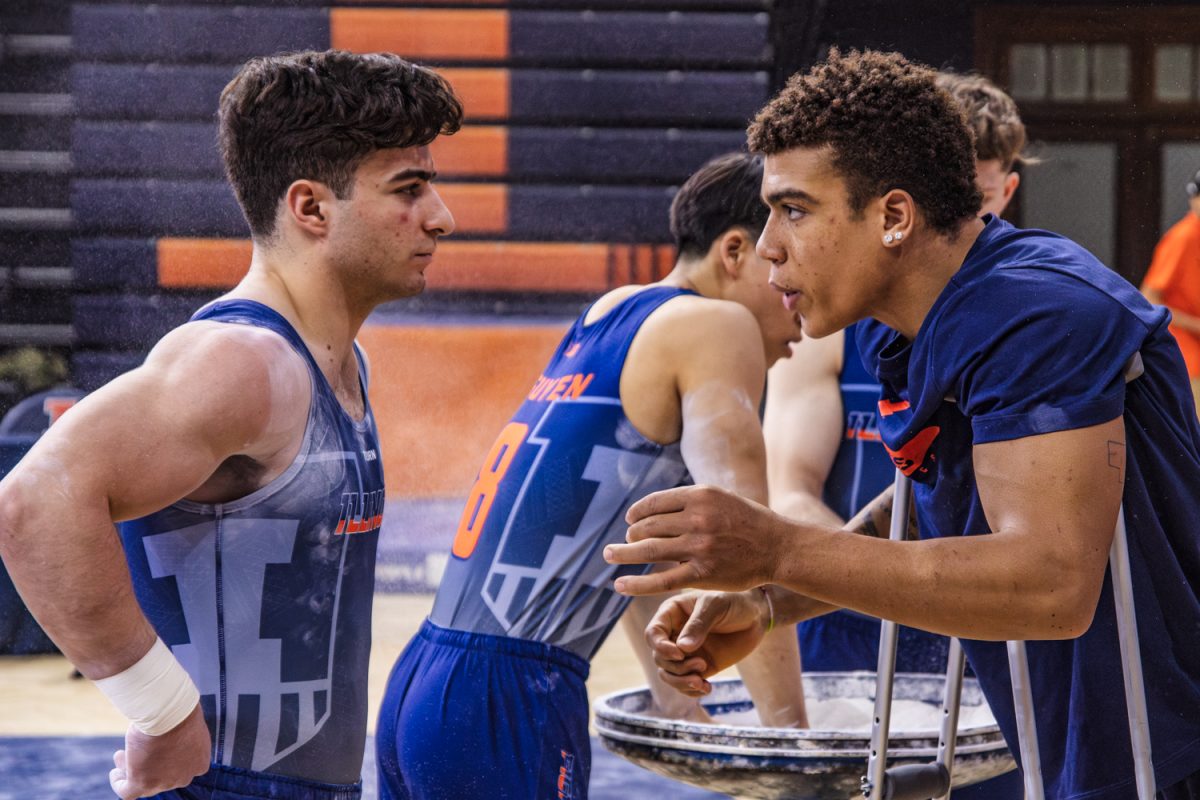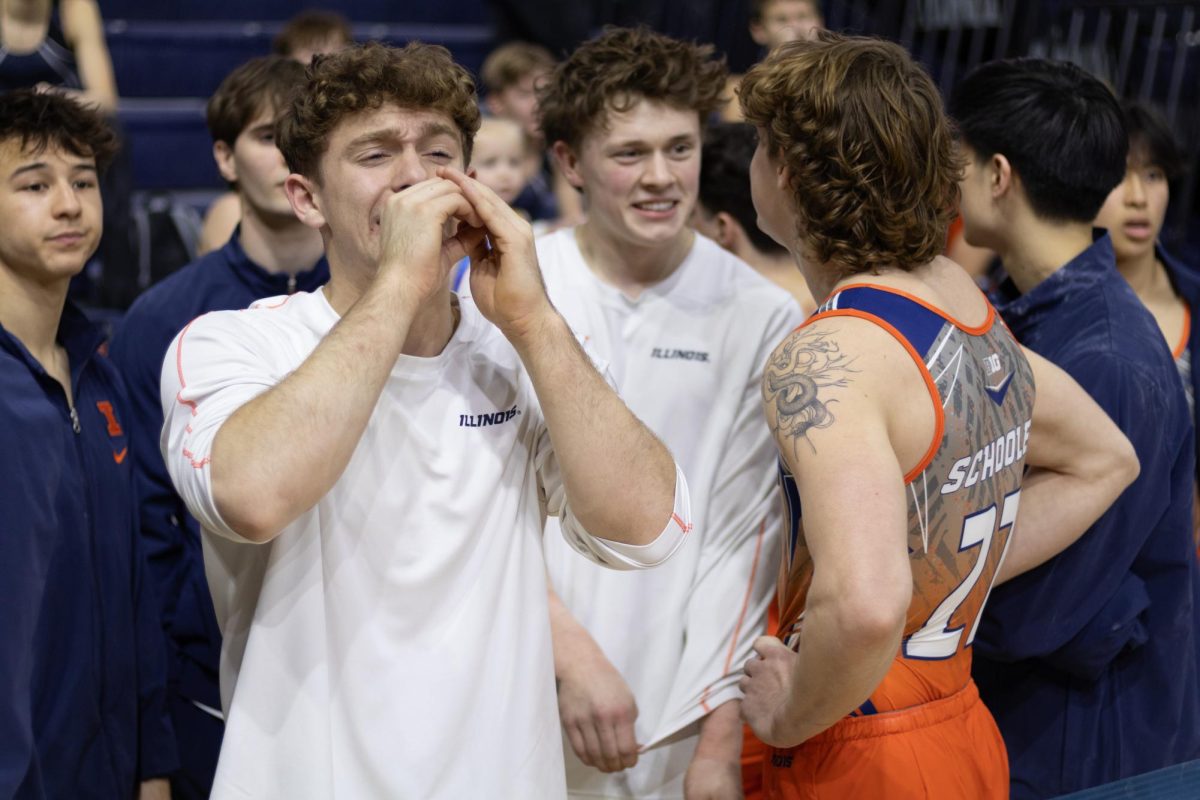The State Farm Center crowd buzzed in anticipation as junior Amari Sewell stepped up to the vault at the Big Ten championships event finals. He qualified the day prior with a 14.800, but with five of the best vaulters in the Big Ten yet to compete, Sewell needed to do something special to make a push for the podium down the stretch. Earlier in the day, teammates both former and current asked him if he was going to try to stick the landing. That was not his focus as he stared down the runway.
“I didn’t try to go for the stick because, when you go for it, sometimes it doesn’t work out the way you want it to,” Sewell reminisced. “So I just knew that I needed to land on my feet and do a good vault with that, which would give me a good score.”
Sewell took off down the runway like a blur, pushed off the springboard, gracefully flipped through the air and stuck the landing. State Farm Center, in a frenzy, roared with their approval. More importantly, the judges showed theirs as his score shone from the scoreboard: 14.825.
He hung on to win gold at the event finals.
“I don’t want to say that it was a dream come true because I didn’t even think to dream that far,” Sewell said. “But it was beyond my wildest dream.”
Get The Daily Illini in your inbox!
In fact, just three years prior, Sewell was unsure if he would ever compete in college gymnastics again. Sewell was unaware competing in college was even a possibility until three years into high school. Despite not necessarily shooting for the moon, Sewell has regardless landed among the stars by embracing every stage in his journey.
Sewell grew up in Maryland within an athletic family, with him and his three siblings playing sports growing up. However, gymnastics was not one of them at first. His father coached a plethora of other sports, so initially Sewell only played on his football, basketball and baseball teams. Whereas many athletes find inspiration to continue playing a sport they picked up when they were very young, Sewell found inspiration elsewhere.
“My mom took us to the circus and there was a young boy doing a bunch of flips,” Sewell said. “And then I tried to replicate that.”
To keep him from hurting himself, Sewell’s mother enrolled him in a gymnastics camp. A couple of years later, he joined the team.
“Ever since I joined the camp I enjoyed gymnastics, and then joining the team made it more competitive,” Sewell said. “So that just sparked the love for gymnastics right there.”
Beginning competition at age 11 was unique to the sport, however. Most gymnasts begin training essentially from birth or whenever they begin to walk, putting Sewell a little behind his competition when he started. Some of his teammates started as early as two years old and were a few levels ahead of Sewell for some time. Since he did not have many expectations because of starting so late, however, he was able to keep a good mindset and avoid too much discouragement from comparing himself to others. But soon enough, he caught up to the competition.
“I think being a little older kind of helped,” Sewell summarized. “But it also was kind of weird.”
Funny enough, Sewell did not realize that gymnastics existed in college until his junior year of high school. It was only when his coaches recognized his talent and encouraged him to look into it that he considered the possibility. Collegiate gymnastics was not necessarily a childhood dream, but an opportunity that presented itself.
That opportunity came from the University of Iowa during his senior year of high school, offering him a walk-on spot.
“I didn’t know Iowa existed at the time,” Sewell joked. “My mom was like ‘Yeah, the Iowa coach is on the phone’ and I was like ‘Where’s Iowa?’”
Unfortunately, after one season with the Hawkeyes, his question about the existence of the state foreshadowed the state of existence of the gymnastics program. Before his sophomore year, the university opted to discontinue the program due to financial hits during the COVID-19 pandemic. They gathered the members of the four cut sports into Carver-Hawkeye Arena to break the news. An emotional Sewell was left searching for answers in the aftermath.
“It was just unbelievable,” Sewell lamented. “I didn’t understand how you were going to make this debt back (by) cutting the four ‘least’ sports if we don’t make you money and we don’t cost you that much money? I just didn’t understand.”
Whereas some athletes’ knee-jerk reactions would be to transfer immediately in pursuit of a full collegiate gymnastics career, Sewell was content with a different path.
“I was just going to be done,” Sewell said. “I was going to actually be the women’s team manager.”
It was only after his friends Zach and James, who both compete at the University of Nebraska now, encouraged him to look into continuing his career elsewhere that he made the effort. Sewell mentioned that without his friends, he would not be competing today. After reaching out to Illinois and taking a trip to Urbana-Champaign, he decided to become an Illini.
With that, Sewell took Illinois men’s gymnastics by storm. He was an NCAA Postseason Vault All-American his sophomore year, and he received a First Team All-Big Ten nod this past season. But for all the ways Sewell contributes in the gym, his impact goes beyond just the scores he puts up. He is a team culture captain; strengthening the bonds between his fellow teammates has been a priority for him as an Illini.
“Making sure that the relationships between each other as gymnasts was great was my first goal,” Sewell emphasized. “Making sure that everyone felt safe enough to share their feelings, share their fears, share their goals, share their passion, share their interest in life — I feel like it was the thing that I needed to make sure I did for all 19 other men.”
In a sport where success can be marked by a number on a scorecard, Sewell remains adamant that his goals for the future do not rest in his individual achievements, but rather in the success of his teammates.
“My goal is to help each and every male gymnast achieve their goal,” Sewell said. “So my own personal goals, I feel like, are second to theirs. And even without my captain title, I want my teammates to achieve their goals and do the best that they can because that brings me joy.”
As for a wish Sewell has for the sport, he wants more people to follow it and recognize the hard work, spanning over years, that gymnasts put into their routines.
“If I could snap my fingers and magically get 20,00 people there, I would snap those fingers so fast,” Sewell furthered. “Those 364 days all play a role in that 365th day of you getting to stand up on a podium, and sometimes it’s not even just one year that it takes.”
For Sewell, it took 11 years of hard work and dedication in and out of the gym to win a first-place title at the Big Ten championships, despite many unknowns, unprecedented circumstances and a change in his journey.
As a leader who wants to see his teammates succeed in any aspect of their life no matter the goal, Sewell’s overall impact will last longer than his time on the team.






